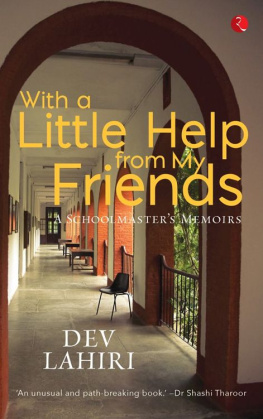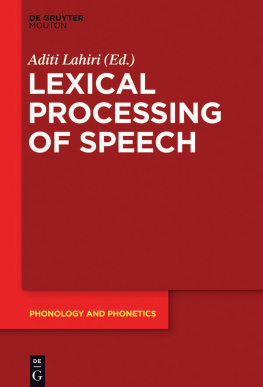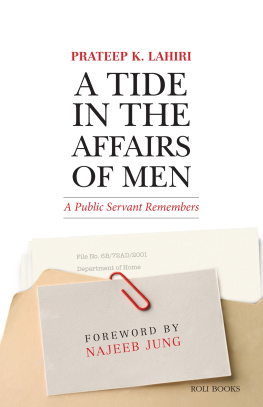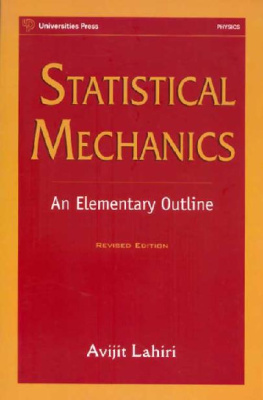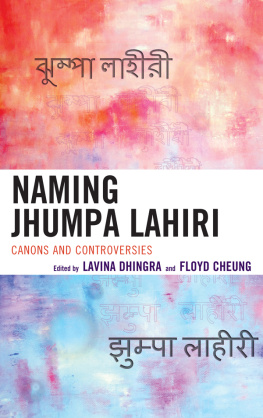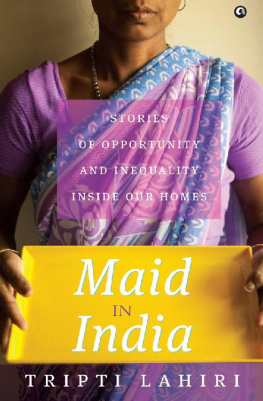
Born in 1951 in an army family, educated at St Stephens College Delhi and St Catherines College Oxford (as a Rhodes Scholar), Dev Lahiri worked as a tea planter, lecturer in history and an editor before switching to teaching. He began his career as a teacher/Housemaster at Doon School and then went on to head Lawrence School, Lovedale and Welham Boys School, Dehradun. He lives with his wife, Indrani and their two dogs, Zak and Ellie, in Dehradun.

Published by
Rupa Publications India Pvt. Ltd 2016
7/16, Ansari Road, Daryaganj
New Delhi 110002
Copyright Dev Lahiri 2016
The views and opinions expressed in this book are the authors own and the facts are as reported by him which have been verified to the extent possible, and the publishers are not in any way liable for the same.
All rights reserved.
No part of this publication may be reproduced, transmitted, or stored in a retrieval system, in any form or by any means, electronic, mechanical, photocopying, recording or otherwise, without the prior permission of the publisher.
eISBN: 978-81-291-3908-5
First impression 2016
10 9 8 7 6 5 4 3 2 1
The moral right of the author has been asserted.
This book is sold subject to the condition that it shall not, by way of trade or otherwise, be lent, resold, hired out, or otherwise circulated, without the publishers prior consent, in any form of binding or cover other than that in which it is published.
CONTENTS
FOREWORD
All who are engaged in teaching children in schools have an onerous responsibility of shaping a person who essentially is capable of sustaining a successful livelihood which is cocooned in uncertainties, failures, successes and progress. To teach to chart a course through an unpredictable future, to understand and accept change, to understand ones role in the community are the imponderables that become the syllabus of an educator over and above imparting the skills of the 3 Rs. The overwhelming demand of the latter subsume the needs of true education that prepares for life and puts the teacher in a real dilemma.
Dev Lahiri solved this problem by using his own life experiences in his interaction with children. So be it road running, facing the most adverse personal difficulties, pursuing his interests with single minded dedication, never wavering from the values learnt from his humble middle class upbringing, he made sure that his students shared his interests, learnt his values and were as uncompromising as him in upholding truth and integrity. His totally child-centred approach singles him out as an unique teacher of young minds.
Rhodes Scholars are undoubtedly exceptional and most rise to prominence of leadership in their countries in various and diverse fields. Of all the careers that Rhodes Scholars have chosen after their education, surely school teaching must be a rare exception. Yet it is probably one of the most important professions to choose as one quietly and without fanfare, and I might say much recognition, shapes the lives of thousands of children to face the future. Imbibed with his personal qualities of integrity, grit, determination and a sense of fun, this Rhodes Scholar in my mind stands out as having served the objectives of the Scholarship in its fullest sense and provided leadership in a sphere that truly builds on the foundation of a country.
I am glad that Dev has penned his experiences. They are all to do with how his life was concluded from a schoolboy into a school teacher and subsequently as a Principal. There is much to read and learn from. All school teachers should understand from this important autobiography that they are indeed people who play a very important role which more often than not go unsung.
Shomie Ranjan Das
Retd Head of Mayo College, Ajmer, Lawrence School, Sanawar and Doon School, Dehradun
PREFACE
Do not judge me by my successes, judge me by how many times I fell down and got back up again.
Nelson Mandela
This is, strictly speaking, not an autobiography. I am aware that my life is not important enough for people to spend hours poring over a book on it. Yet bits of my life have been extremely interesting; especially a few events and the people involved in them. If nothing else, I hope the reader finds some entertainment value in the pages that follow. Perhaps what could be of interest are the insights into human behaviour on issues like honesty, trust and integrity.
There have been grave injustices in my life. Yet this is not an expos. It is, however, an attempt to put on record for the first time, my side of the story and in so doing perhaps be the voice for many Heads of Schools who may have suffered in the manner that I have. It would also provide, to those who are interested, a glimpse into the way some of our better-known institutions are run and how difficult it can sometimes be for those on the spot to deal with the powers that surround them. If I have written about specific instances and specific people who I think have been less than fair with me, it is not as an attempt to get my back on them or in a spirit of rancour, but as an attempt to expose the vulnerability of people in my position.
The position of Head of School in our country, particularly in a residential school, is not an easy one. We are the chief administrators, chief security officers, chief personnel managers, chief educationistsall rolled into one. We have little or no training for the job. Moreover we have many different constituencies to answer to, be it the governing body, the parents, the faculty, the students, the support staff or the alumni. On several occasions these constituencies have conflicting interests. To add to our woes we have no union to stand up for us in times of need.
In penning the pages related to my headship of schools, I have been acutely aware of the loneliness of this position and I hope that in so doing I have been able to portray to some degree the difficult nature of this job.
Whilst I cannot dream of being in the same league as the Natwar Singhs of this world, I suppose that some at least might be interested in the travails that even ordinary mortals such as headmasters of schools have to go through. One then gets some idea of what the man-on-the-street has to endure.
When I look back, I believe my life, on the whole, has been a fairly remarkable journey. If I am still around to tell my story, it is largely because of the kindness of a large number of friends and well-wishers and that includes my own family and my old students. It is to them that I dedicate this book.
Childhood with the Army
M Y MOTHER was seven months pregnant with me when she was bitten by a supposedly rabid dog. I am told that I was delivered almost as soon as the course of injections (fourteen in those days) was administered. This, I suspect, has a lot to do with the madness that seems to have constantly haunted my life ever since. This particular incident could also account for my love for dogs to this day.
My childhood was much like that of any other army brat; a series of postings to locations both interesting and boring. This meant that I was enrolled in a series of different schools. When I was three, my older brother, then seven, was packed off to a boarding school. While this was probably a well thought out move of my parents to secure a steadier education for him, it unfortunately created a huge gap between my brother and I. I ended up going to a different boarding school a few years later. Although my brother has stood by me through thick and thin, it has only been a few years since we have managed to bridge the gap and become the best of friends.
Next page
